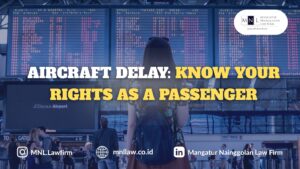
Flight delays are a common occurrence in air transportation. However, delays can have significant impacts, affecting business agendas, family matters, and even physical and psychological health. In response, the government as the regulator has issued rules that must be followed by airlines, including how airlines treat passengers who experience delays.
What is a delay?
A delay or flight delay is a condition in which the departure or arrival schedule of an aircraft does not align with the previously determined time. Article 1 point 30 of the Minister of Transportation Regulation Number 89 of 2015 concerning the Handling of Flight Delays (Delay Management) for Scheduled Commercial Air Transport Businesses in Indonesia (“Permenhub 89/2015”) defines a delay as a time discrepancy between the scheduled and actual time of departure or arrival.
Technically, delays can be caused by four factors:
- Airline management factors. These are caused by the negligence of the airline’s management leading to flight delays, such as: delayed pilot, co-pilot, and cabin crew, catering delays, ground handling delays, waiting for passengers either checking in, transferring aircraft, or on connecting flights, and aircraft unpreparedness.
- Operational technical factors. These arise from technical obstacles related to the condition of the airport during departure or arrival, including: airports being unusable for aircraft operations, disruptions to airport surroundings or runways such as cracks, floods, or fires, aircraft queueing for take-off, landing, or departure slot allocation at the airport, or delayed refueling.
- Weather factors. These are natural conditions such as heavy rain, flooding, lightning, storms, fog, haze, visibility below the minimum standard, or wind speed exceeding the maximum limit that affects flight safety.
- Other factors, which are outside of airline management, technical operations, or weather—such as riots and/or demonstrations within the airport area.
Delay Classification
Legally, Permenhub 89/2015 classifies flight delays based on the length of delay into six (6) categories:
- a. Category 1: 30 to 60 minutes
- b. Category 2: 61 to 120 minutes
- c. Category 3: 121 to 180 minutes
- d. Category 4: 181 to 240 minutes
- e. Category 5: more than 240 minutes
- f. Category 6: flight cancellation
Airline Obligations in the Event of a Delay
One of the obligations of airlines experiencing delays is to provide services to passengers who arrived according to the scheduled time. Article 9 of Permenhub 89/2015 obliges airlines to provide compensation based on the category of delay, namely:
- Category 1 delay: compensation in the form of a soft drink;
- Category 2 delay: compensation in the form of drinks and snacks (snack box);
- Category 3 delay: compensation in the form of drinks and a full meal (heavy meal);
- Category 4 delay: compensation in the form of drinks, snacks (snack box), and a full meal (heavy meal);
- Category 5 delay: compensation in the form of IDR 300,000.00 (three hundred thousand rupiah);
- Category 6 delay: the airline must transfer the passenger to the next available flight or refund the full ticket cost; and
- For delays in categories 2 to 5, passengers may choose to be transferred to the next flight or receive a full ticket refund.
However, if the delay is caused by operational technical factors, weather conditions, or other factors beyond the airline’s control, the airline is exempt from the obligation to provide compensation.
Legal Remedies for Passengers Harmed by Flight Delays
Resolution through District Court
Passengers who suffer losses due to flight delays may file a lawsuit with the District Court by attaching supporting evidence and documents.
Legal basis for the claim:
- Article 1365 of the Civil Code (KUHPerdata/BW) → Unlawful acts causing losses require the party at fault to compensate the damage.
- Consumer Protection Law (UUPK) → The consumer’s right to sue a business actor that violates their rights, including the right to compensation according to the regulations.
The lawsuit can seek material and immaterial compensation due to the failure to provide compensation or services as stipulated in Permenhub No. 89 of 2015.
Out-of-Court Settlement
According to Article 45 paragraph (2) of Law No. 8 of 1999 on Consumer Protection, passengers may choose to resolve disputes through consumer dispute resolution institutions outside the court, which is faster and less expensive. The Consumer Dispute Settlement Agency (BPSK) is an option, offering mediation, conciliation, or arbitration through a quick, simple, and low-cost process.
Administrative Resolution
Passengers can report airlines to the Ministry of Transportation through the Directorate General of Civil Aviation or the Airport’s Air Transport Consumer Complaint Service Unit. These reports can serve as a basis for administrative action against airlines that fail to fulfill service obligations under the regulations.
Legal basis:
- Law Number 1 of 2009 on Aviation
- Law Number 8 of 1999 on Consumer Protection
- Minister of Transportation Regulation of the Republic of Indonesia Number PM 89 of 2015 on the Handling of Flight Delays (Delay Management) for Scheduled Commercial Air Transport Businesses in Indonesia
Authors :
- Muhammad Arief Ramadhan, S.H.
- Dina Normanza Sibagariang.
Editor :
- Muhammad Arief Ramadhan, S.H.
